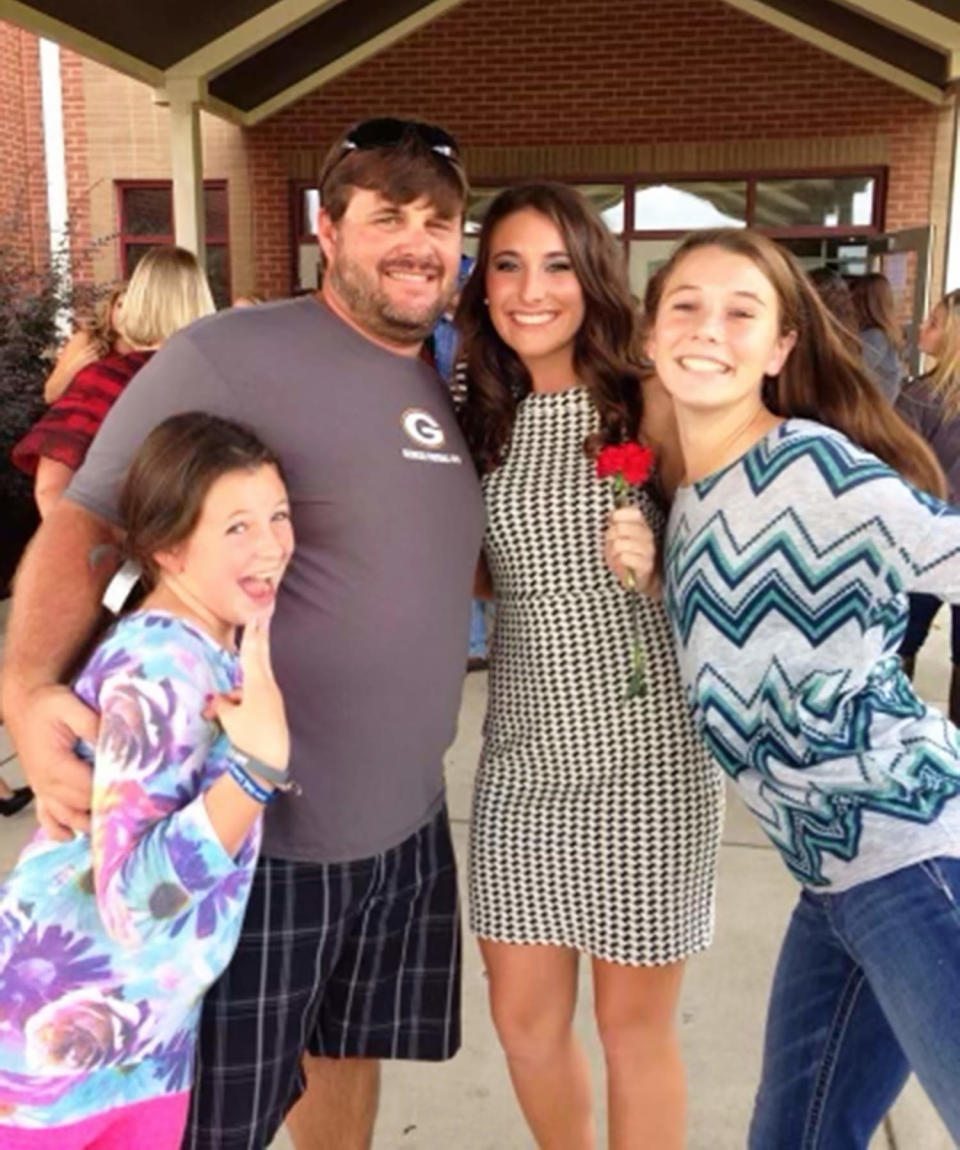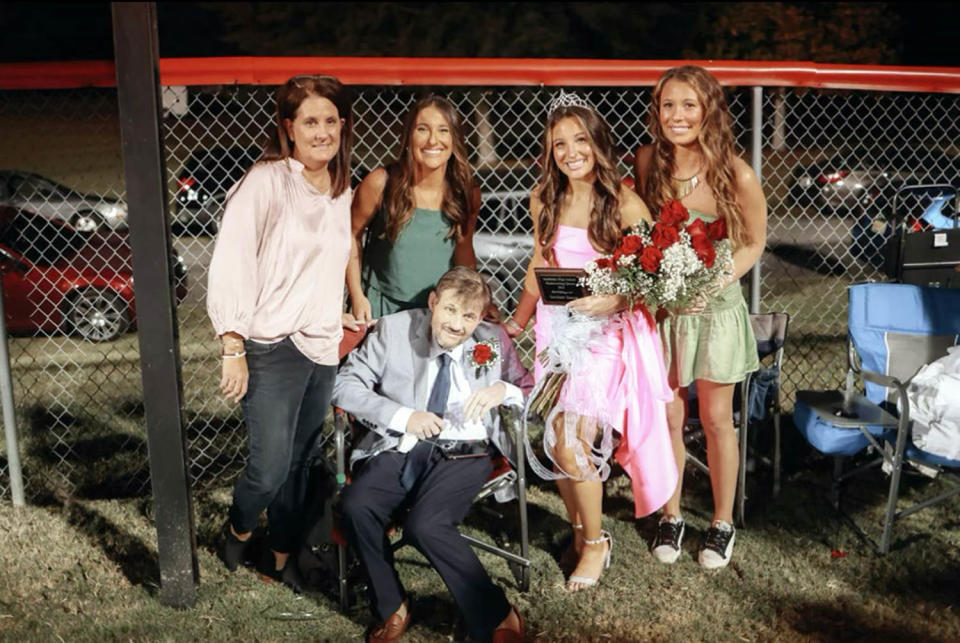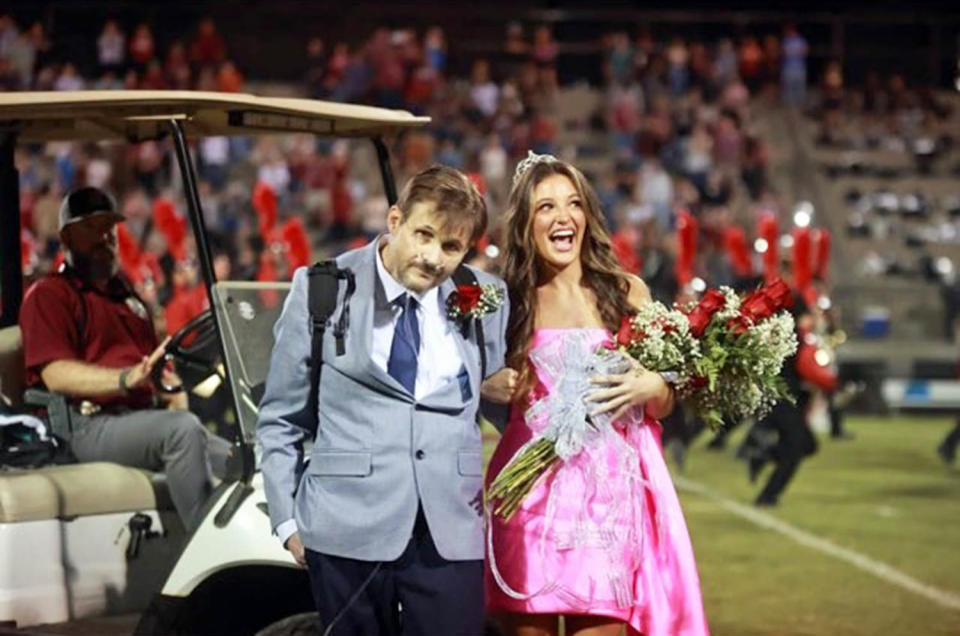See the moment dad with stage 4 cancer finds strength to escort daughter at homecoming
Over the past six years, Brett Yancey, 47, spent time in and out of hospitals receiving treatment for stage 4 esophageal cancer. Sadly, that means the dad of three needed to skip some of his daughters’ sporting events, dances and other milestones. But when his youngest daughter, Sara Kate, 17, was nominated for homecoming queen and needed her dad to escort her during the football game, he felt determined.
“We missed a lot. We’ve missed a lot of ballgames. We missed a lot of award ceremonies,” his wife, Carrie Yancey, 48, of Southside, Alabama, tells TODAY.com. “We have traveled a lot for treatment, but this was one of those events that Brett just said, ‘I’m going to do it.’”

Prior to homecoming, Brett Yancey experienced some paralysis in his left leg and doctor suspected a neurological problem. It was unclear if he could even walk, and Carrie Yancey suggested alternatives, such as him riding in a golf cart. But Brett Yancey was adamant.
“(He said), ‘I’m going to walk her across that field. I’ll walk my baby across that field,’” Carrie Yancey recalls.
Swallowing problems led to a diagnosis
Carrie and Brett Yancey started dating in seventh grade and have been married for 25 years. Carrie Yancey calls him her “soulmate” and recalls how he enjoyed coaching his daughters — Savannah, 24, Sydney, 21, and Sara Kate— in sports before he became ill.

“He coached my girls in travel ball since they were babies,” she says. “He’s always wanted to make an influence on kids in coaching and that was his mission.”
A little over six years ago, Brett Yancey, then 41, struggled to swallow. His doctor recommended he undergo an esophageal stretching procedure, used to help open a narrowed esophagus. But the doctor performing that procedure made a startling discovery.
“That doctor found the cancer,” Carrie Yancey says. “It all started with those symptoms of not being able to swallow properly. It probably had been there for quite some time.”
At first, Brett Yancey was diagnosed with stage 3 esophageal cancer, and doctors performed a minimally invasive surgery to remove part of his esophagus. For about a year, his scans showed he was cancer-free. But then the cancer returned.
The doctors in Alabama felt unsure about treating his advanced cancer, which had progressed to stage 4, and the Yancey family began traveling to MD Anderson Cancer Center in Houston. They lived there for eight weeks at the start of the COVID-19 pandemic in 2020 while Brett Yancey underwent chemotherapy and radiation. In August of 2021, Brett Yancey had his esophagus completely removed and replaced with part of his intestine.
“It’s not a very common surgery, but our team in Houston did that. We were in the hospital for roughly 60 days,” Carrie Yancey says. “Everything that could go wrong went wrong.”
Over the years, the cancer has spread to his lungs, brain, carotid artery (which supplies blood to the brain) and his some of nerves. Brett Yancey participated in a clinical trial, but he had to stop after the cancer spread further. He receives ongoing chemotherapy.
Prior to homecoming, Brett Yancey began having some problems walking.
“We had noticed some left leg paralysis and some changes in his behavior,” Carrie Yancey explains. “We knew something was going on in the brain.”
The family needed to wait for an MRI to understand what was happening. But Brett Yancey did not want that to stop him from being there for Sara Kate.
“We weren’t sure that he would be able to walk across the field,” Carrie Yancey says. “We tried every way to get him to take a golf cart. We had mentioned, ‘Why don’t you stand on (the) sidelines .. and let Sara Kate walk across the field herself?’”

But Brett Yancey felt determined to walk her from sideline to sideline. “I was very nervous,” Carrie Yancey recalls.
Esophageal cancer
Esophageal cancer is rare. The American Cancer Society estimates that it accounts for 1% of all cancer diagnoses annually in the U.S., and it more often impacts men.
According to the National Cancer Institute, esophageal cancer most often occurs in heavy smokers, people who drink a lot, older people and those with chronic gastric reflux.
According to the NCI, esophageal cancer symptoms include:
Trouble swallowing
Unexplained weight loss
Sounding hoarse
Coughing
Heartburn
Pain in the chest behind the breastbone
Like many cancers, finding and treating esophageal cancer early leads to a better long-term outcome. The American Cancer Society estimates that about 20% of people with esophageal cancer survive five years after diagnosis.

A 50-yard walk
The MRI revealed that Brett Yancey had dead tissue in his brain likely from radiation used to treat a previous mass there. That contributed to his left side paralysis and personality changes. A few weeks after homecoming, he experienced a 10-minute seizure and then later spent some time in the hospital. He's on oxygen and has been using a walker and wheelchair when needed.
During the homecoming game, Carrie Yancey worried about what might happen.

“My fear was he wasn’t going to make it,” Carrie Yancey says. “I wanted to sit up high where I could see him coming across the field.”
She had a clear view of Brett Yancey steadily walking across the field.
“Tears were falling down my face and I kept thinking ‘You can do it. You can do it,’” Carrie Yancey recalls. “It was just a wonderful moment that I will never forget. I remember looking to friends and people on both sides, and there was just not a dry eye on the field.”

Once the father-daughter duo arrived on the field to join the other candidates, Sara Kate was crowned homecoming queen.
“I’m very proud of my daughter for being recognized by her peers. She is beautiful inside and out, and she gets that from her dad,” Carrie Yancey says. “We are grateful for every day that we have with Brett, and Sara Kate was very honored to have him there.”
Carrie Yancey says she wants people to see how faith and the love of family can keep people resilient in difficult times.
"(Brett's) a warrior,” Carrie Yancey says. “I hope people see a story of strength. (He was) able to walk across a football field when the day before he couldn’t get out of bed.”
Carrie Yancey says this moment also reflects how important Brett Yancey’s daughters are to him.
“It really shows strength and the love a dad has for their kids,” she says. “You just do anything for your children.”
This article was originally published on TODAY.com

